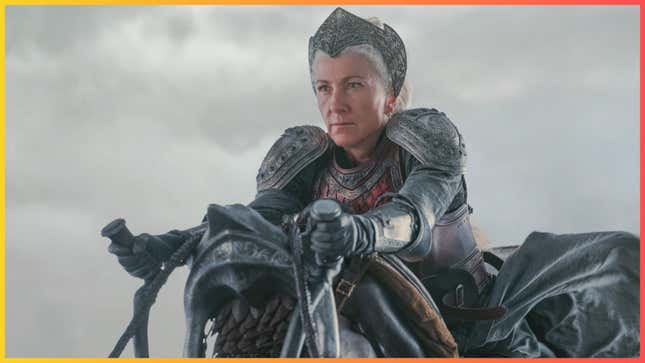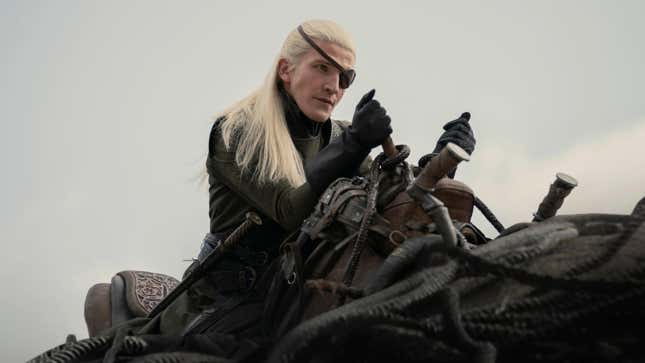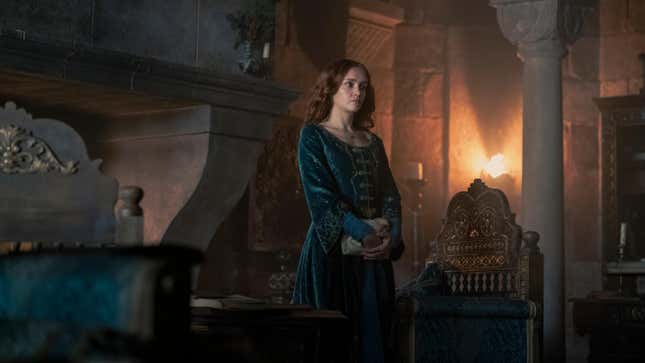
[Editor’s note: This interview contains spoilers for House Of The Dragon season 2, episode 4.]
House Of The Dragon’s season-one finale, in which Vhagar sinks his teeth into a young Lucerys and his ride, was merely an appetizer. In season two’s fourth episode, Vhagar’s new victim proves to be another crushing blow to Team Black, led by Rhaenyra Targaryen (Emma D’Arcy). “The Red Dragon and the Gold” builds up to a crucial battle and ends with a heartbreaking death.
The hour finds Rhaenys (Eve Best) on a warpath to defend Rook’s Rest. She takes her beloved Meleys along, assuming it’ll be easy to stop Criston Cole’s (Fabian Frankel) army. Instead, she’s met with two dragons: King Aegon’s (Tom Glynn-Carney) Sunfyre and Aemond’s (Ewan Mitchell) Vhagar in an open sky. A brutal bashing between the beasts then leads to Rhaenys’ sacrifice, but not without Meleys clawing out and burning up her enemies a fair bit.
“The Red Dragon and the Gold” is directed by Alan Taylor, who returns to this world this season after helming multiple Game Of Thrones episodes. The A.V. Club spoke to him about the nitty gritty of a fiery dragon battle, saying goodbye to Rhaenys, Daemon’s (Matt Smith) haunted visions, and the importance of revisiting important GOT mythology.
The A.V. Club: I want to start with the episode’s big ending. The dragon fight is mesmerizing and shocking. What was your initial reaction when you got the script and how did you break it down in terms of bringing this moment to life?
Alan Taylor: When I first read it, I was just glad that we got to do a dragon fight of this scale. And then I started reading through from the characters’ points of view, which is what you always do first. I was very keen on dealing with Rhaenys’ fate, how she handled it, and how she handled herself. In the first few readings of the script, I saw that the key moment above all else was when she decided to turn back to engage Vhagar. There are many plot points in there, and at least three or four characters that we’re tracking closely. But Rhaenys is the main point, so we made sure to structure everything around that.
In terms of the battle’s impact, the key moment for me was what she’s achieved, which is taking Vhagar on in the sky. We knew going in that we wanted this to become a proxy nuclear event. So what I did was heighten the moment when she decided to go back and have the whole business with her belt. She does this maneuver that my partner and I had learned from studying birds of prey. And then the nuclear blast that is Vhagar falling from the sky; we made a big deal out of that. Everything else sort of got in line with those key beats.
AVC: Logistically speaking, this is an intense, emotional scene but there is a lot of VFX and green screens involved. As a former Game Of Thrones director, was it still overwhelming or exciting to deal with all that?
AT: I’ve been knocking around in Westeros long enough that it wasn’t overwhelming because we’re used to this. The people who do their jobs on this show, like the stunt coordinators and the visual effects team, are so good. I’m grateful that we shot the location stuff first so we could experience the environment of the scene. It helped when I was talking to Fabian Frankel and Freddie Fox, who play Criston Cole and Gwayne Hightower, about their scenes on the battlefield in detail, too. The strangest part was that we did the VFX work later, so we did the dragon-riding stuff at the very end of our shoot. So months later, we shot the close-ups to tie things together. I do think the writers did such a great job with this episode. I think Tom enjoyed being drunk and terrified of his dragon. Eve also really surprised me. She rose to the occasion.
AVC: What was it like working with Eve Best and giving Rhaenys her moment of glory in death? What conversations did you have about what to bring out of her performance?
AT: Eve and I talked a lot about what it meant for Rhaenys to go for it when she knows this might be the end. She said it was important to her how Rhaenys parted with Rhaenyra because they’ve been sort of at odds. But when she goes on this mission, she’s also doing it as an act of reconciliation between them. And in a way, she finished her story with Rhaenyra because they were in sync. Parting with Corlys Velaryon (Steve Toussaint) is a big deal because neither of them knows what’s coming, but anything could happen. We talked a lot about the emotions because of where they are in their relationship.
Within the battle itself, Rhaenys is driving the action because she’s by far the most experienced warrior there. She goes through several stages. In the beginning, she’s coming to do a pretty simple cleanup operation. The first turning point for her is seeing that King Aegon has foolishly turned up himself and that combination for her [makes her] realize, “You idiot.” But also, “I have to do this. I don’t want to but you just made things very simple.” And then, of course, things escalated with Vhagar coming in. We built all the tension around her decision to turn back and confront Vhagar. For me, that carried her whole character because it went back to her decision not to roast the Greens in season one. She also feels anger towards Vhagar for Lucerys’ death. I think she knows that she’s going on a potential suicide mission when she goes back. So I think in her mind, and in my mind, with that fateful decision, she’s readying herself for the end. That’s why when she falls, there’s an acceptance there.
AVC: I want to talk about Vhagar’s entry into the battlefield. We first see her wings flapping and then through the lens of the soldiers and the Lord of Rook’s Rest, who refuses to go anywhere because he’s enamored by this beast. It represents our awe. Was that a conscious decision?
AT: Yeah, the things you’re saying are key. For everything I do, I always try and lock into different points of view so that we’re experiencing it viscerally, not just objectively, and bringing Vhagar in with that was fun. We get to do it from the standpoint of these men. My idea was that we would see wings flapping barely through the trees like sharks going through waters, which is basically Jaws. You see it and you know this is bad. And then we cut from that to the soldiers on the field to Cole. We never go objective on the arrival of the dragon. It’s always about its arrival being experienced by people. We’re already connected to them. So yeah, having that POV is important when shaping a story this big or it could easily become sprawling.

AVC: Aemond commands Vhagar to attack knowing that Aegon is right there. Did you guys want to show through Ewan Mitchell’s sly smile that he’s willing to sacrifice his brother or he’s taking revenge for being belittled by him?
AT: The delight of having an actor like Ewan is that it can be all of the above. First of all, it’s a strong tactical move to just blast preemptively with fire. But besides the resentments he carries from previous episodes with his brother, there’s again a similar feeling of, “You idiot; you’re asking for this.” There was a very good plan to take the castle and destroy Meleys. Aegon turned up and screwed up everything. And so in a way, Aemond is thinking he asked for it. It’s a petty motive, but with Ewan, you see a play of many, many motivations. There’s a kind of bitterness to the way he calls out “Dracarys.” There are a lot of things going on in his head, and you see that complexity later as well when he’s standing at the crash site.
AVC: The dragon vs. dragon battle is the big climax of an episode filled with a lot of character-driven moments. That’s something you’ve pulled off in other shows you’ve directed like The Sopranos, Interview With The Vampire, and GOT, of course. As a director, why is it important for you to have these scenes?
AT: Thank you. You know, sometimes you read comments from viewers, and I try not to, but you can feel their impatience because they want to only see dragons smashing around. At the same time, even those who are complaining, the reason they care so much is because they’re being led inside those fights by these characters. I won’t name other huge fantasy shows out there, but I think there are shows that don’t quite do the work that Game Of Thrones and House Of The Dragon have always done, which is to make these incredibly three-dimensional characters you care about as individuals. So when you do step onto a dragon fight, the outcome is epic but also very emotional. I was happy that in episode four, which is consumed by this fight in the last several minutes, I got to do other things like introduce Oscar Tully, played by Archie Barnes. I also got to properly introduce Alys Rivers (Gayle Rankin) and spend time with her. These are pivotal characters who are going to have their own stories.
AVC: The episode opens with another reminder that Daemon is being haunted by his past deeds, and Milly Alcock returns for another cameo. It was cool to see her have a proper dialogue with him in Valyrian this time about his guilt.
AT: I hadn’t worked with Milly before, I only knew her from the first season. She comes in and speaks only in Valyrian, and she’s absolutely fluent in it. She gives such a great performance. Her young Rhaenyra is telling Daemon everything he knows is true and can’t stand to hear. Of course, Daemon’s fluent in Valyrian, but in his dreams, or rather his nightmares, he can’t understand her. That was a fun way to start the episode. It’s also the first scene we shot.
AVC: Alicent also has a few pivotal conversations in this episode. What was it like working with Olivia Cooke to help her character process the information she learns about Aegon’s conquest?
AT: Yeah, with both Olivia and Emma, a lot of the talk was about how Alicent and Rhaenyra are metabolizing the conversation they had, which is not in the book and was created for the show. It’s powerful because of the two actors doing the scene. So now, we see a side of Alicent we haven’t seen before. We wanted to show that when she’s dealing with Aegon...I mean, she’s so over it. There’s some bad mothering going on there [laughs]. Her scene with Larys Strong (Matthew Needham) is also beautiful because he’s poking her and she just lets him have it calmly. She lays waste to his attempts to manipulate her. I think she’s starting to get to a dark place, and we wanted to establish that so it can play out in subsequent episodes.

AVC: Rhaenyra divulges the secret of “A Song of Ice And Fire” to her son, Jacaerys. As someone who’s directed multiple Game Of Thrones episodes, do you think it’s necessary to keep going back to this connective tissue? The shows are connected but this is the most direct way it happens.
AT: I don’t think it’s quite as built into the books, but it was a choice not to deny that connection. It’s to let it hold a real mythic power. That scene Rhaenyra has with Jace [Harry Collett], I just loved the mother-and-son moment. When she decides to tell him the story, it’s very personal because she feels like she needs to tell him the same way she was told by Viserys [Paddy Considine]. We shot it twice because the first time the dialogue was much shorter. The second time we filmed it, we went into more detail about the “Song Of Ice And Fire.” It was nice because then we got to do more of the montage to go with Rhaenyra’s words. But I think it’s important to recognize there is a mythology and it’s driving these characters and what they are wrestling with, even if we know what comes later.
AVC: You bring a ton of juxtaposition to the planning scenes with the Greens and the Blacks in both season-two episodes you’ve directed, the premiere and “The Red Dragon and the Gold.” How much does it play in your head to reveal how these teams are approaching the battle?
AT: Thankfully, there’s a lot of experience with those huge boardroom scenes because they can go on for a couple of days and there’s so much to cover. I’ve always liked them because they’re relatively simple. The blocking is done, and people are mostly sitting around. So it can become about the performance and how you connect people with eye lines. I knew the task was to show how their worlds are similar yet different. We brought in chairs for the painted table at Dragonstone to make it correlate to the small council chamber. In both rooms, different viewpoints are being raised but also dysfunctional people are running the show. On one side, it’s a bunch of male egos contending. And on the other, Rhaenyra is missing for the most part, so it’s about how her family is faring in her absence. In the long run, the Blacks are more on task and focused on the best way forward. But the Greens are doing a better job of it, and it’s partly because of wild cards like Aemond. That’s one of the reasons Rook’s Rest was a victory for them. Their secret plan pays off but it also blows up in their faces.
AVC: Speaking of that, the episode ends on a cliffhanger. Can you tease anything about what happens next with Aegon?
AT: It was important to be unclear about Aegon’s fate because Criston doesn’t know exactly what has happened. It’s also important to keep everything that happened at Rook’s Rest a secret because the realm cannot find out.
AVC: With the show renewed for season three, are there conversations about you returning to direct again?
AT: They have happened. I love this world, but I spent almost a year away from my family, so I don’t think I’ll be a part of season three. But I know it’ll be in great hands, and at some point in the future I’d love to come and visit because it’s such a rare TV show.